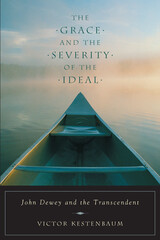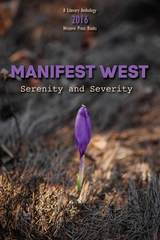
Kestenbaum argues that to Dewey, the pragmatic struggle for ideal meaning occurs at the frontier of the visible and the invisible, the tangible and the intangible. Penetrating analyses of Dewey's early and later writings, as well as comparisons with the works of Hans-Georg Gadamer, Michael Oakeshott, and Wallace Stevens, shed new light on why Dewey regarded the human being's relationship to the ideal as "the most far-reaching question" of philosophy. For Dewey, the pragmatic struggle for the good life required a willingness "to surrender the actual experienced good for a possible ideal good." Dewey's pragmatism helps us to understand the place of the transcendent ideal in a world of action and practice.

Volume 5, Manifest West Series, Western Press Books
Serenity and severity form a classic Western dichotomy with many manifestations. Beautiful growth and renewal follow a terrifying and destructive forest fire. Rain upon a hayfield can be interpreted as grace or judgment from above, depending on the season. The unpredictability of nature provides hikers with a breathtaking view one day and a life-threatening scenario the next. Yet the nature of the West does not only imply the outdoors. The people of the West encounter serenity and severity in all aspects of life, and this duality impacts their identity and shapes their lifestyles, outlooks, worldviews, and values. This year’s collection includes political discussions, philosophical ponderings, and lighthearted humor that are all a part of life in the West.
For the fifth volume of Manifest West, twenty-nine writers explore this theme, revealing the duality of Western life through many different narrative trails—including governed environment, overwhelming fires, hiking adventures, and the effect of location on family. Creativity and diversity come to this anthology in both content and form, with flash fiction joining Manifest West’s standard genres of creative nonfiction, short fiction, and poetry. Their combined reflections enable us to see the intense relationship between humanity and nature; sometimes nature directs humans’ lives, to their harm and to their benefit, and other times, humanity abuses the very environment it cherishes as its home. Authors bring their personal styles, voices, and experiences with life in the West to contribute to a balanced and unique interpretation of serenity and severity.
Contributors: Rebecca Aronson, Betsy Bernfeld, Heidi E. Blankenship, Kaye Lynne Booth, Sarah B. Boyle, John Brantingham, William Cass, David Lavar Coy, Benjamin Dancer, Gail Denham, Patricia Frolander, John Haggerty, Lyla D. Hamilton, Michael Harty, Rick Kempa, Don Kunz, Ellaraine Lockie, Nathan Alling Long, Sarah Fawn Montgomery, Juan J. Morales, Lance Nizami, Ronald Pickett, Terry Severhill, David Stallings, Scott T. Starbuck, Abigail Van Kirk, Victoria Waddle, Evan Morgan Williams, Steven Wingate
Manifest West is Western Press Books’ literary anthology series. The press, affiliated with Western State Colorado University, produces one anthology annually and focuses on Western regional writing.
READERS
Browse our collection.
PUBLISHERS
See BiblioVault's publisher services.
STUDENT SERVICES
Files for college accessibility offices.
UChicago Accessibility Resources
home | accessibility | search | about | contact us
BiblioVault ® 2001 - 2024
The University of Chicago Press









